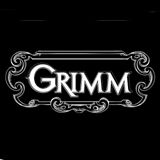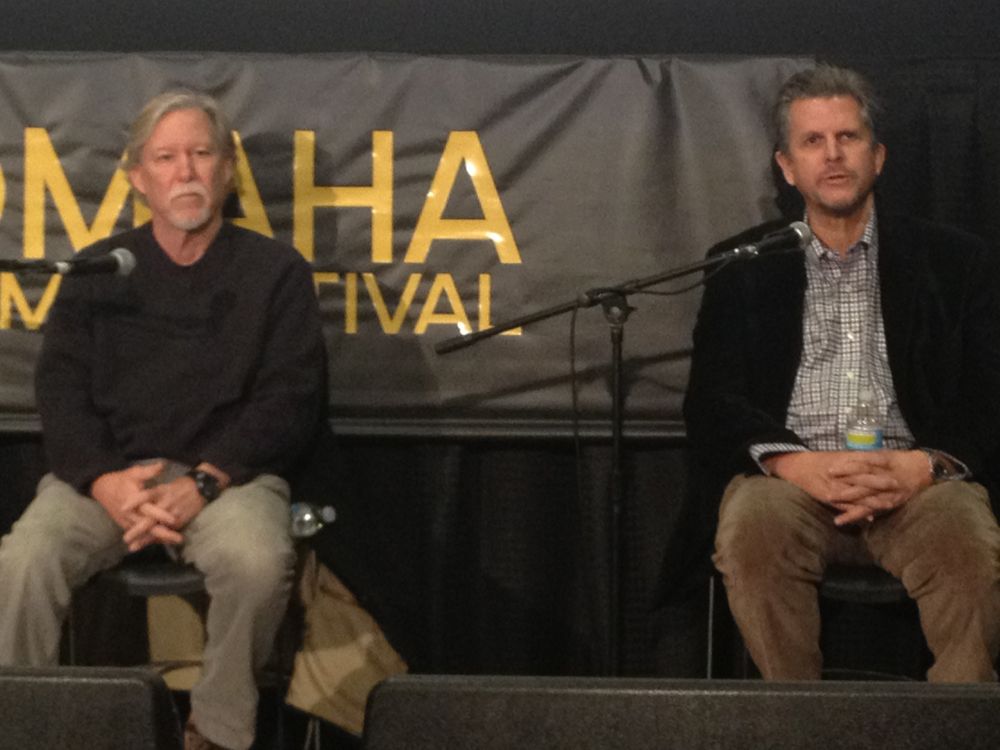Grimm creators/showrunners Jim Kouf and David Greenwalt entertained an enthusiastic crowd March 10th at the Omaha Film Festival in Omaha, Nebraska, just two days after the fantasy police procedural returned to NBC with respectable ratings after a nearly three-month hiatus.
Moderated by KIOS-FM’s Cheril Lee, the discussion began with a three-minute video summarizing the first half of Season 2, ending with the fall cliffhanger depicting Juliette in the hospital and unable to recognize Nick. When the applause died down, Lee asked whether Juliette will remember Nick.
“Well, stay tuned,” Greenwalt teased, eliciting laughter from the audience.
“It looks like we’re leading that way,” Kouf added.
“Yes, it looks like we are leading that way,” Greenwalt said. “But who she ends up with is another question, too.”
Lee then opened the panel to audience questions, the first of which regarded whether the character Rosalee, played by Bree Turner, is leaving. “She [Turner] may have had a baby and we had to send her away for a bit,” Greenwalt said.
“We had nothing to do with that,” Kouf joked.
The next question was from a man who said he couldn’t get into Once Upon a Time and wanted to know what the Grimm writers were doing that helped him suspend disbelief. Kouf said they try to keep Grimm grounded in reality. “For us there is no fantasy world,” he said. “For us it’s the beast lives within. So we are explaining the ‘child molester’ as the monster that lives within us. We’re just putting a face to the monster.”
“It’s kind of a coincidence that both shows came on around the same time,” Greenwalt said, adding that Grimm was originally developed about six years ago by Todd Milliner and Sean Hayes, who are two of the show’s executive producers. Milliner was in his shower trying to think of books that were in the public domain, and had an idea of doing a modern-day Grimm. “Right away we knew we didn’t want to have two worlds — a fantasy world and a real world,” Greenwalt continued. “We wanted it all to be OUR world. It’s also a hybrid show. It’s partly a procedural show and partly a genre show and I think that’s appealing to people. We have a great genre fan base, but we have other people coming to the party because it is also a crime drama.”
“We’re also careful about how we do certain things,” Kouf said. “We ground it in reality. So when someone like, say, Juliette has a passion for someone else — well, that happens in real life. And people forget, there is a natural condition where people can lose part of their memory. We go to the books and we go, ‘How close to reality can we make this?’ Even potions and spells and things like that we try to ground in reality, so there’s very little ‘hocus pocus’ going on. That’s what helps people get connected to it.”
The next question came from a fan who noticed there were many storylines hinted at in the first season that were discarded or not developed in subsequent episodes, and that the second season has more continuity.
“Well, when we started we felt people wouldn’t be able to connect if there was too much mythology or too much serialization,” Greenwalt replied. “So we wanted more stand-alones — and so did the network. So we had monster-of-the-week, crime-of-the-week. Solve it. But as we got deeper into the show in the second half of the first season, we got to know these characters a bit better and they got a little more complex. So then we had to balance it a bit more for the fan who watches the show regularly, but still be accessible to a new viewer.”
The next question was whether they pitched the network just the pilot or the entire season. “Don’t they wish we were able to pitch the whole season,” Greenwalt laughed. The questioner then asked how much of the season’s plot they knew in advance. “Last season, we knew we were going to go to the point where Nick’s mother resurfaces,” Greenwalt said. “We knew that much. But we didn’t know how that was going to happen.”
“We have a general idea of where we’re going,” Kouf added. At the beginning of the season, the writers get together in a room and come up with episodic story ideas and real-life situations to which they can add a “fairy tale” element. Then they take the main characters and develop their relationships as the stories go along. Kouf added that it’s difficult to plot too far ahead. “You have to allow them time to behave — so you know then where they’re going to go,” he said. “Then they [the characters] tell us where they have to go. And we try to pre-plan some of the other stuff.”
“Do you have a favorite character that you like to write for, or does that change?” Lee asked.
“Well, we love all our children,” Greenwalt replied. “But it is certainly fun to write Monroe, who we kind of discovered as we were writing the pilot.” He explained to the uninitiated that Monroe is a big bad wolf creature called the Blutbad who’s trying to be reform and not tear people part (he does pilates and takes anti-depressants). “When we were doing the pilot he didn’t come in until the third or fourth act. But we found this weird point of view that this character had. Nick the Grimm was the big boogeyman to Monroe by the way he was raised. So suddenly we have this whole new twist on everything. And he is just full of information and non-sequiturs and knows a little bit about everything so I think he is awfully fun to write.”
That led to an observation from an audience member who noted that Monroe was used as a humor device in earlier episodes and that the humor element seems to have dissipated.
“Oh, you’ll get more of him,” Kouf said. “There’s one episode coming up that’s just a comedic episode. We’ve always tried to keep humor in everything we’ve done. That’s just the way we write.”
Asked by Lee to walk the audience through the process of writing an episode, Kouf said, ““A lot of it is an episodic idea. Who is the villain of the week and what’s so interesting about this villain that we want to spend 45 minutes with him? A lot of it is allowing the characters to develop so if you allow those characters to kind of tell you where they want to go, then that part is kind of done for you. Sort of. But we just sit down in the room and start hashing it out. What’s going to happen next? Where have we taken these people to this point? We’re going to do some interesting things coming up with Juliette. Juliette’s memory is going to get jogged in really interesting ways. That’s going to take a while to work itself out. And we’re going to take her to the verge of ‘Am I crazy or not?’ So that’s a lot of fun with her. And everybody else is going to have to go along on that ride.”
“We did an episode last year about a creature who was a spider-woman (‘Tarantella’),” Greenwalt said. “It was a particularly disgusting episode. She sucked out your innards and vomited them in your mouth. But what I liked about that episode is that the so-called villain had a great point of view. If she didn’t do these things — she was actually in love with her husband and was a good mother, she was a soccer mom — and if she didn’t do these things she would age and die prematurely. So like some of the good Stephen King villains, they have a good point of view — they’re not just evil, you know.”
“But the actual process is, we come up with an idea and we write two pages and we send them to the network. And they say ‘Yes, we like it,’ or ‘No, we don’t.’ or ‘We like it but remember to do this,’” he continued. “And then we go to the breaking of the story, and that is the most difficult and also the most important. You break down every scene. Who’s going to say what? What’s actually going to happen? The spine of the story. We make an outline. And we send the outline to the network and they weigh in on that with notes. And then we write the script pretty quickly. Jim and I write it in about five or six days, and our other writers do it in about 10. And that’s the process.”
“We spend a lot of time with every script, and we really think it through,” Kouf said. “We’ll throw away our own stuff. We rewrite every script that comes to us from the other writers. If it’s no good, we throw it away and we do it ourselves. So every script comes through us.”
“And on a rare occasion, the studio or the network will throw away a script and ask us to do it a different way, and that’s not uncommon in TV or movies to redo stuff,” Greenwalt added. “In September, we were planning the so-called midseason cliffhanger, and we had an episode we liked and there were certain cliffhanger-y things that happened with the characters, and we had had the story approved, so we had written the script. And the network called on a Friday and they said, ‘We don’t like it — we want a whole new thing. We like the story and you can do the story later but we want a bigger cliffhanger. I went away for the weekend and Jim wrote an entire outline that was the last show you saw [in the fall], and it was fantastic. It didn’t really have a monster of the week but it had all of our characters doing good and dastardly things to each other so it worked out really well.”
Grimm airs Fridays at 9 p.m. ET/PT on NBC.


